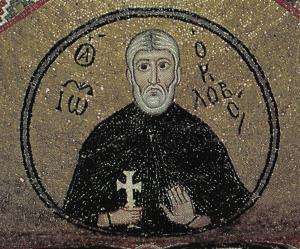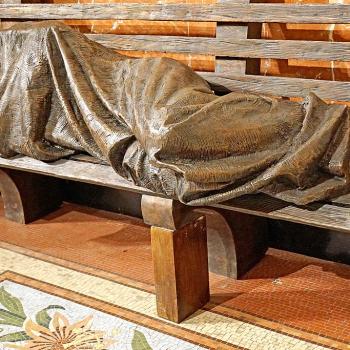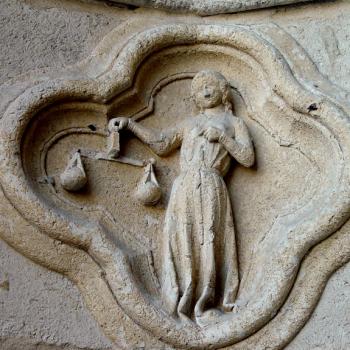
“Greater love has no man than this, that a man lay down his life for his friends” (Jn. 15:13 RSV). Both in what he said, and what he did, Jesus taught us the way of love. His life was the life of love; his word was the word of love. When he spoke, he spoke out of love. When he acted, he acted out of love. His words were verified by his deeds, even as his deeds were verified by his words. The two go together. He is the Word of God made flesh; he showed the world the love of God by laying down his life for the good of all. There is no greater love than the love of God. It is not merely that Jesus laid down his life that is important, but rather, that he did it out of love. In laying down his life, Jesus showed that love is self-sacrificial, that it reaches out and gives completely of the self, if need be, in order to help the beloved made whole. Love honors the dignity of the beloved and does not undermine it.
Jesus spoke, not only so that we could know the greatness of God’s love for us, but also so that we could realize what it means to follow after him. We are meant to be people of love. We are to embrace his way of love and care for the world and all that is in it. We should be concerned for the well-being of others, looking after them and their needs. Abba John the Dwarf, understanding this, was willing to sacrifice his honor if it meant it would help someone else retain their dignity:
One day when Abba John was going up to Scetis with some other brothers, their guide lost his way for it was night-time. So the brothers said to Abba John, ‘What shall we do, abba, in order not to die wandering about, for the brother lost the way?’ The old man said to them, ‘If I speak to him, he will be filled with grief and shame. But look here, I will pretend to be ill and say I cannot walk any more; then we can stay here till the dawn.’ This he did. The others said, ‘We will not go on either, but we will stay with you.’ They sat there until dawn, and in this way they did not upset the brother.[1]
Abba John was willing to sacrifice his purity for the sake of his brother, the guide who had lost his way. He was willing to pretend he was sick and needed rest, though he did not. To be sure, lying is an intrinsic evil, however, when it is done out of love, when it is done to promote the greater good, and the lie is mild, perhaps an exaggeration of some truth, the gravity is very mild— indeed, it is more mild than the sin which would have happened if he had let people come needlessly to harm. Abba John understood the economy of the situation and followed the best option which was left to him, realizing that it was better to think out of the demands of love than to follow the rigid claims which emerge from legalism.
The guide should have known his way to Scetis, but, he found it difficult, if not impossible, to do so in the dark of night. If John had not indicated it was time to rest, using the pretense of feeling sick as a reason to stop and rest, the guide, and the monks with him, would have continued journeying in the darkness, going deeper and deeper into the desert, becoming further and further lost. Indeed, they might have gone so deep into the desert, they might never have found their way to Scetis. As it was, Abba John was able to both protect his party of monks, but also to protect the dignity and honor of the guide.
We, then, must consider those around us, and act in accordance with their dignity. We should lower ourselves, if need be, in order to raise them up. If Jesus, the Logos, emptied himself of his divine glory to be with us and the rest of creation, we can easily empty ourselves of all pretense of glory if it means we help someone save face. It is better for us to act like fools while being full of charity than it is to appear intelligent and be without love. It is better to act out of love than it is to act out of self-righteousness, for love is pure while righteousness done for the sake of self-glory is not. It is better to do something which we think is impure and save someone else, out of an act of love, than it is to be legalistic and ignore the expectations of love in such a situation. Love covers a multitude of sins, but self-righteousness only multiplies them.
There is another lesson we can learn the story of Abba John the Dwarf. Allegorically, all those who sin, all those who get caught up in some bad habit, can be said to have lost their way. It would be easy to discourage them and make them despair by pointing out how far they are from the way of the saints, or worse, from our own perceived righteousness. It would be easy for us to ridicule them, and in doing so, make sure they wander further astray in the night of sin, unable to find their proper place in the light of day. This is what we should not do. Rather, when those around us lose their way, when they get caught up in various vices, we should follow the example of Abba John. We should love them. We should meet them where they are at, appearing to be just like them, so that then they know that we are in this together, because it is when we are together, and not apart, that we will find our way.
The Christian path is the path of love. The journey we make should be the journey of love. Even those who know the way, the saints, are human, and sometimes stumble and get caught up in the darkness around them. If they can get lost, so can we. We can and should honor them and their dignity, even if they stumble, realizing how much worse we would be without them, how much worse we would have stumbled if we did not have their guidance in our lives. Likewise, when we deal with others, when we guide others through what we know, we should do so out of love, respecting their dignity by never discouraging them, lest we become the stumbling block which prevents them from attaining their full potential in life.
[1] The Sayings of the Desert Fathers. trans. Benedicta Ward (Kalamazoo, MI: Cistercian Publications, 1984), 89 [Saying of Abba John the Dwarf 17].
Stay in touch! Like A Little Bit of Nothing on Facebook.
If you liked what you read, please consider sharing it with your friends and family!













